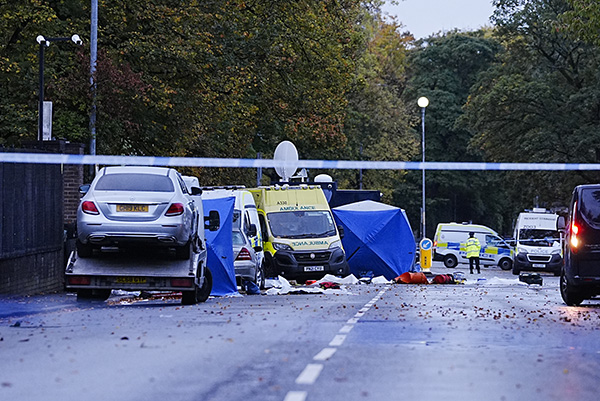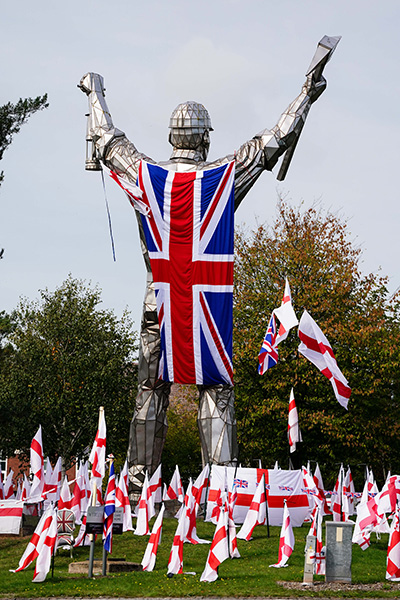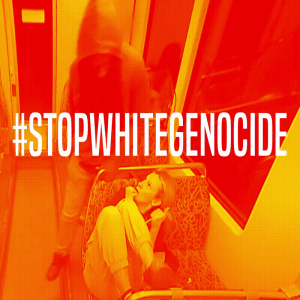Credit Image: © Lauren Hurley/Avalon via ZUMA Press
Some people claim that all reality is just a simulation. If so, one must question the writers who named the murderer who attacked a synagogue in Manchester on Yom Kippur “Jihad al-Shamie,” or “holy warrior from Syria.” The jihadist from (you guessed it) Syria was a “British national” who immigrated to Britain and was given citizenship in 2006. This is enough for the BBC to identify him simply as a “British man.” Two people were killed and three were wounded after a car and stabbing attack; the murderer was shot dead by police. Two other men and a woman have also been arrested by police.
Some deaths are pointless tragedies that we are expected to overlook, such as those caused by traffic accidents. Others are cases where the emotional responses of the victims must be carefully managed by the state. For example, in 2017, Muslim terrorists bombed an Ariana Grande concert, killing 22 people. The government decided “extremism” was the problem, and a memorial for the victims ended with mourners singing the pop song “Don’t Look Back in Anger.” Ariana Grande has since moved on to complaining about Donald Trump.
This killing was different. British Prime Minister Keir Starmer said that the killer “attacked Jews because they were Jews.” He further vowed to do “everything in my power to guarantee you the security that you deserve, starting with a more visible police presence.” Jewish groups will enjoy extra security from the British state. “I promise you that this Britain will come together to wrap our arms around your community and show you that Britain is a place where you and your family are safe, secure and belong,” he said.

Credit Image: © Peter Byrne/PA Wire via ZUMA Press
It is a notable contrast to the way white British gentiles were treated by their government after the stabbings in Southport. In that case, details about the killer’s identity were not released in the aftermath, including his ties to terrorist groups and his previous involvement with the “anti-extremist” group Prevent, which aims to dissuade would-be killers from violence. Though the late Mr. Jihad was never involved with Prevent, we already seem to know more about his background, and the government confidently declared terrorism the motive. The larger community in Southport did not get special protection; instead, outraged British people who rioted or spoke too freely online were swiftly punished by the state. A man convicted of “organizing” the riots on Telegram, for example, received seven and a half years in prison.
There is no explicit white nationalist state that will pressure the United Kingdom to treat white Britons favorably. In contrast, though Jews in the United Kingdom may feel under siege, Israel is pressuring London on their behalf. “As I warned at the UN, weakness in the face of terrorism only brings more terrorism,” said Prime Minister Benjamin Netanyahu. “Only strength and unity can defeat it.” Just days ago, the President of Israel, Isaac Herzog, asked King Charles III to confront growing anti-Semitism in the United Kingdom. “While this is not a new hate, this [anti-Semitism] is something Jews have always lived with,” said Keir Starmer after the attack. “We must be clear, it is a hatred that is rising once again, and Britain must defeat it once again.” The Board of Deputies and the Jewish Leadership Council both said they had feared an attack was coming because of “rising anti-Semitism” in the country.
Much of this alleged anti-Semitism is coming from the matter of Palestine. The United Kingdom recently recognized a Palestinian state. However, rather than giving it credit, a Palestinian group is now demanding reparations from London for alleged abuses committed when the territory was under British control. Pro-Palestine protests also took place in London after the Manchester attack, including clashes with police. A further demonstration will take place in Trafalgar Square on Saturday.
The rise of political Islam in the United Kingdom will make any attempt to prioritize fighting anti-Semitism difficult for Labour. Labour already lost critical races in recent elections to independent Muslim candidates who asked voters to send a message over Gaza. A divide within Labour between Jews and Muslims is something Keir Starmer cannot afford. He enjoys support from only 13 percent of voters, making him the most unpopular British prime minister on record. Labour is also being challenged from new parties on the Left, including Jeremy Corbyn’s “Your Party,” though it is already plagued by infighting.
The Manchester attack will increase political tensions within the Labour Party and is a boost to Reform. The Tories have become almost a non-factor. Nigel Farage openly boasts that he will replace them. Yet almost half of voters in a recent poll said that Reform’s policies are “racist,” despite Nigel Farage’s milquetoast stance on remigration. That may not matter. If there was a general election anytime soon, it is very possible that Reform would win a majority and Nigel Farage would be prime minister. Another recent poll found Reform is 16 points ahead of Labour, suggesting the Prime Minister’s attack on Mr. Farage and his party at the recent Labour convention did not work.
Perhaps more than any other country in the West, the United Kingdom is entering a period of ethnic and religious fragmentation. Operation “Raise the Colours” gave the indigenous English people a symbol to rally behind, the St. George’s Cross. The Palestinian flag has become a symbol of Muslim ownership of territory. Indians and Pakistanis feud in British streets when relations between the two powers decline. Jews in the country feel under siege, and Reform has staked out a pro-Israel stance, with Nigel Farage opposing recognition of a Palestinian state. The future of British politics may look like Lebanon, where it is taken for granted that political parties and movements are stand-ins for certain ethnic, religious, and tribal interests.

September 29, 2025: The Brownhills Miner statue, which has been draped in a Union flag, in Walsall, Staffordshire. (Credit Image: © Jacob King/PA Wire via ZUMA Press)
The stabbing at the synagogue is not in itself a historic milestone. Terrorist attacks in once-Great Britain are so common that this will soon be overcome by another news cycle. Yet the reaction will have important political consequences. The British government moving to protect Jewish communities and institutions will probably anger some Muslims. The flight of Muslims away from Labour and toward their own parties in some areas will accelerate. Meanwhile, Jews will probably shift towards the Right, moving closer to the Tories or even Reform in the same way some Jews shifted towards Donald Trump after October 7. Rather than calming the political climate, recognizing Palestine will make things even more tense, angering pro-Israel Jews while inspiring Muslims to push for greater concessions.
What we are likely to see in the United Kingdom is what is already happening on the Continent. The two establishment, “conventional” parties — the Conservatives and Labour — are likely to fade. New political forces on the populist Right and Left will take their place. The debates will center on issues such as healthcare, Gaza, inflation, and immigration. However, behind the ideological arguments will be the true issues of race and religion. The synagogue stabbing is likely to be another in a string of petty acts of political violence between ethnic groups. Thanks to mass immigration, the British government is no longer the director of a mighty empire, but a colonial overlord trying desperately to keep inter-community tensions from spilling over in what used to be its own country.
The post The Colonial Government of the ‘YooKay’ appeared first on American Renaissance.
American Renaissance













